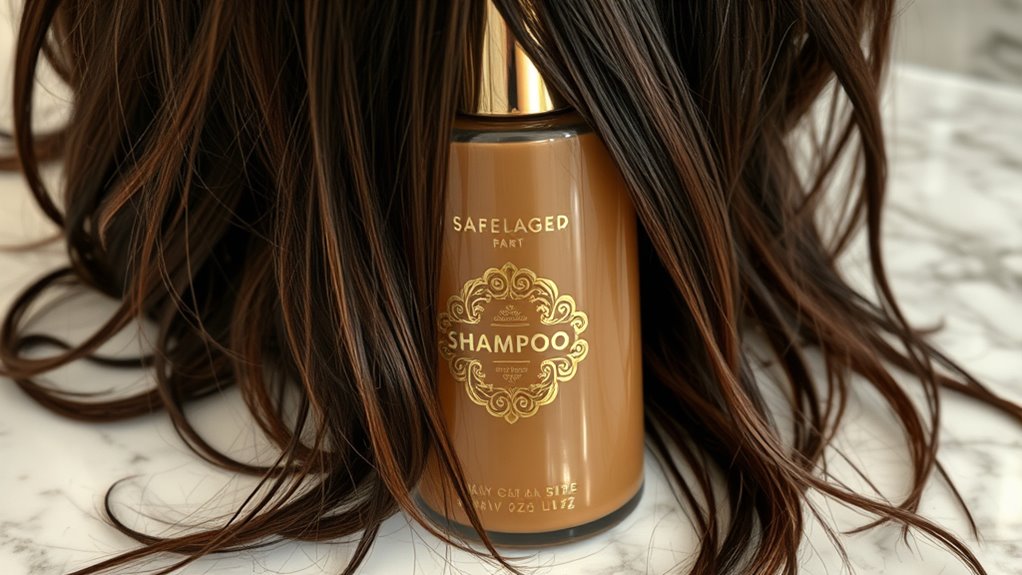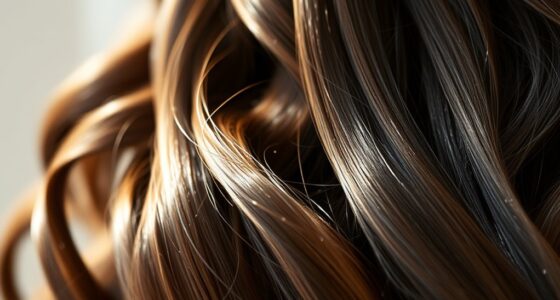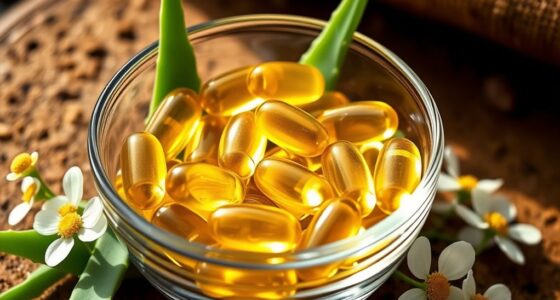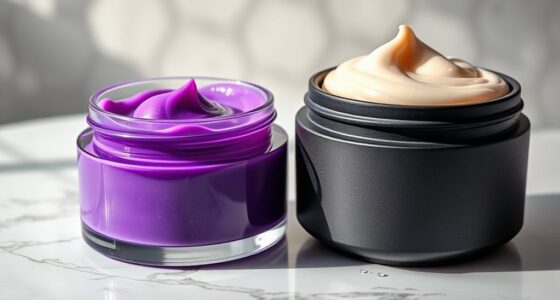Expensive shampoos often contain harsh chemicals like sulfates, silicones, and synthetic fragrances that can strip your hair’s natural oils, cause buildup, and irritate your scalp. These ingredients may dry out, dull, or weigh down your hair over time, even if the product looks luxurious. Smart choices, with gentle, sulfate-free formulas, can improve your hair health. Stick around to discover how affordable options might be better for your hair’s lasting health.
Key Takeaways
- Expensive shampoos often contain harsh chemicals like sulfates, silicones, and preservatives that can damage hair and scalp health.
- High-cost products may include fillers and additives that do not enhance hair quality, leading to buildup and dullness.
- Luxury shampoos frequently have artificial fragrances and synthetics which can cause irritation and allergic reactions.
- The price tag may reflect marketing rather than better ingredients, so costly shampoos aren’t necessarily more effective or safer.
- Regular use of pricey shampoos with harmful ingredients can weaken hair, cause dryness, and lead to hair loss over time.
The Costly Myth: Are Expensive Shampoos Better for Your Hair?
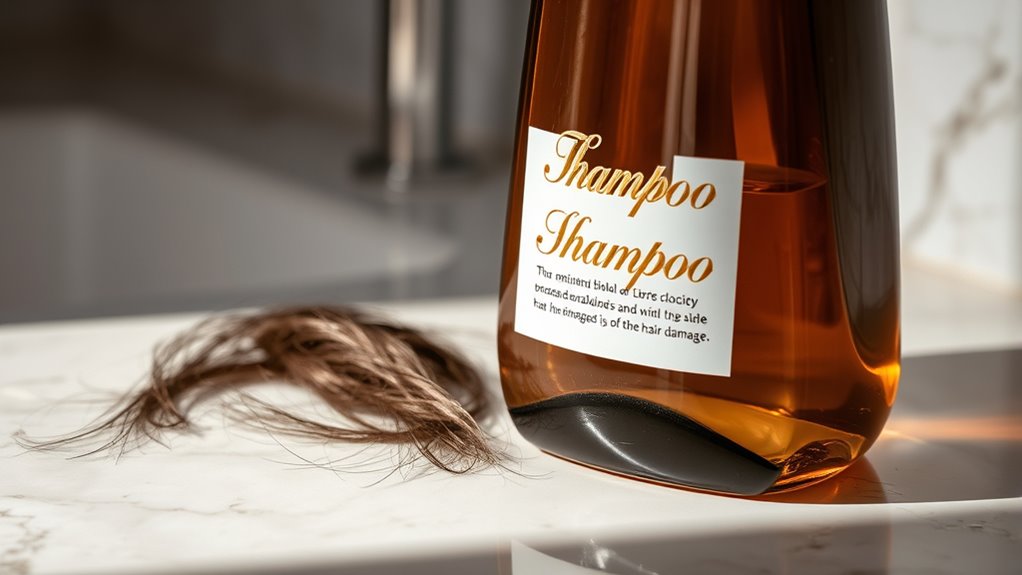
Many people assume that spending more on shampoo guarantees better hair, but that’s often a misconception. Expensive shampoos don’t always deliver improved hair health. In fact, many high-end hair care products contain harsh chemicals that can strip moisture and cause damage over time. The price tag doesn’t necessarily reflect quality or effectiveness; some luxury shampoos have similar or even fewer beneficial ingredients than affordable brands. Instead of relying on cost, focus on formulas tailored to your hair’s needs. Fillers and marketing-driven additives in costly shampoos often don’t enhance hair quality. Switching to more affordable, scientifically formulated shampoos can sometimes improve your hair’s condition, proving that a higher price doesn’t mean better results for your hair. Additionally, being aware of hair care ingredients helps you choose products that truly benefit your hair rather than just expensive packaging.
Common Ingredients in Luxury Shampoos That Could Damage Hair
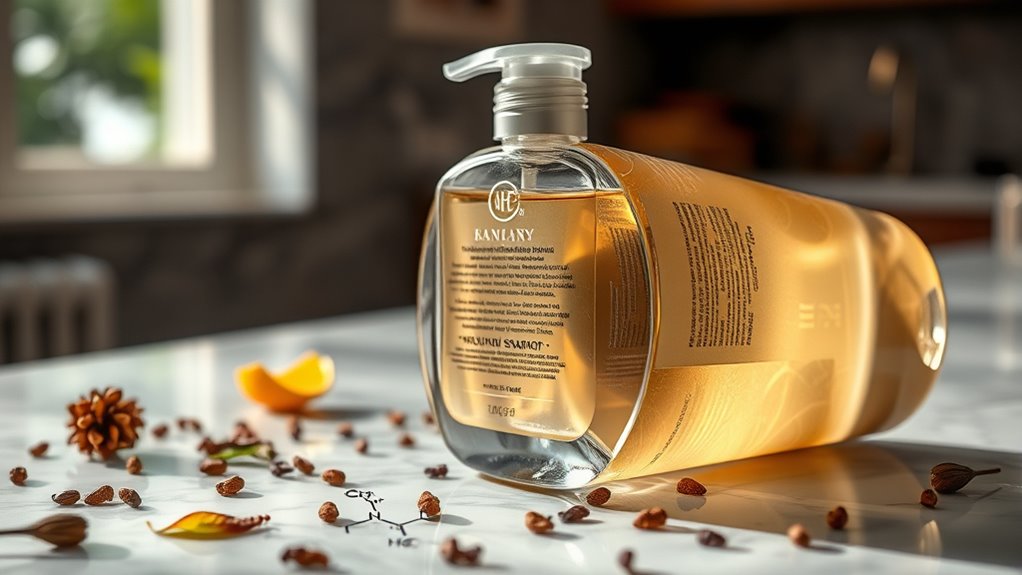
Luxury shampoos often contain ingredients that can harm your hair rather than improve it. Sodium lauryl sulfate, a common sulfate, strips natural oils, leading to dryness and scalp irritation. Silicones like dimethicone create buildup that weighs hair down and blocks moisture from reaching your scalp. Formaldehyde releasers such as DMDM hydantoin are used as preservatives but can cause allergic reactions and weaken hair strands over time. Parabens, also preservatives, are linked to hormonal disruption and may negatively affect hair follicles. Additionally, some botanical extracts and fragrances in high-end products can trigger sensitivities, causing itching, redness, or hair damage. While these ingredients might promise luxury, they can actually contribute to hair problems instead of solving them. Considering the preppy dog names that reflect sophistication and style, choosing hair products free from such harmful ingredients can help maintain a healthy and polished look. It’s also important to be aware of potential allergens that may be present in luxury shampoos, which could lead to adverse reactions.
How Sulfates and Silicones in High-End Products Affect Scalp and Hair Health
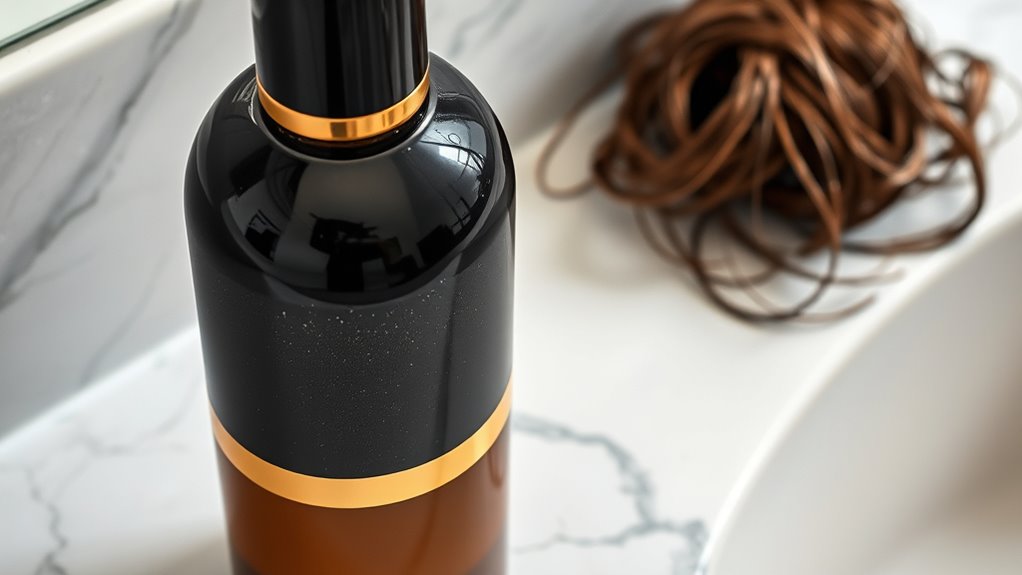
Sulfates can strip your scalp of natural oils, leading to dryness, irritation, and even scalp conditions like eczema. Silicones coat your hair, creating buildup that dulls your shine and blocks moisture absorption. When used frequently, these ingredients can weaken hair fibers and cause breakage over time. Incorporating glycolic acid into your hair care routine can help exfoliate the scalp and improve overall hair health.
Impact of Sulfates on Scalp
Sulfates like sodium lauryl sulfate and sodium laureth sulfate are powerful surfactants that create the rich lather many people associate with clean hair. While effective at removing dirt and excess oils, they can also strip away your scalp’s natural oils, leading to dryness and irritation. For those with sensitive scalps or dry hair, this irritation can worsen scalp conditions like dandruff or eczema. Over time, sulfates may weaken the scalp’s skin barrier, making it more vulnerable to inflammation. Using clarifying shampoos regularly can help remove sulfate buildup, but frequent use may also strip oils and cause further dryness. If you notice itching, flaking, or increased scalp sensitivity, sulfates could be the culprit behind your scalp irritation and hair damage. Additionally, research suggests that sulfates may contribute to scalp inflammation, further compromising hair health. Understanding the chemical composition of these ingredients can help consumers make more informed choices about their hair care products. Being aware of personal sensitivities can guide you toward gentler, sulfate-free options that promote healthier scalp conditions.
Silicones and Hair Build-up
Although silicones like dimethicone and cyclopentasiloxane can make your hair look shiny and smooth, they tend to build up over time, leading to dullness and weighed-down strands. This buildup creates a barrier that traps dirt, oil, and product residues, which can impair scalp health. This buildup can also hinder the absorption of nourishing treatments, reducing their effectiveness. When combined with sulfates in high-end shampoos, the cleansing process can strip natural oils, leaving your scalp dry and irritated. Without regular use of clarifying shampoos, silicone residue accumulates, clogging hair follicles and scalp pores. This can cause scalp irritation, dandruff, and even hair thinning, especially in sensitive individuals. Additionally, the influence of cultural trends on beauty standards can encourage excessive use of such products, leading to compromised hair health and complicating scalp conditions. To maintain healthy hair and scalp, consider balancing silicone use with occasional clarifying treatments to prevent buildup and support scalp health.
The Hidden Risks of Preservatives and Fragrances in Pricey Shampoos
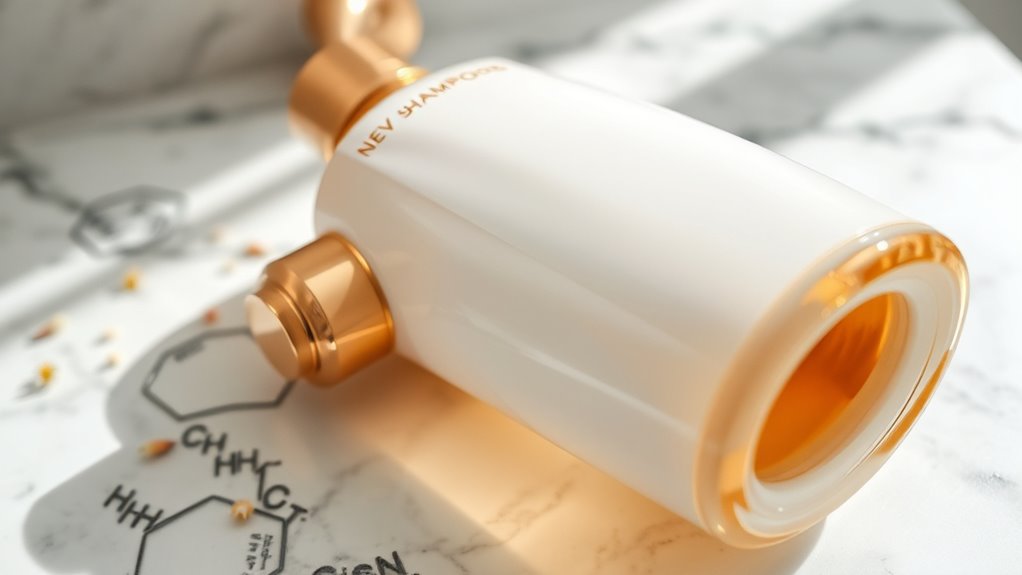
Many high-end shampoos contain synthetic fragrances and preservatives that can irritate your scalp and trigger allergic reactions. These chemicals may also disrupt your hormones and weaken hair over time. Being aware of these hidden risks helps you choose safer, healthier options for your hair. Additionally, some ingredients in expensive shampoos can lead to skin irritation, especially if you have sensitive scalp conditions. Regular use of such products without understanding their impact can also contribute to hair damage and loss over the long term. The rise of automation in business underscores the importance of choosing products that support health and well-being without unnecessary chemicals. Recognizing the importance of proper product formulation can help you make more informed choices when selecting hair care. Incorporating insights from ethical hacking principles, such as thorough testing and evaluation, can also encourage brands to improve product safety and transparency.
Harmful Chemical Additives
While expensive shampoos often boast premium ingredients, they frequently contain synthetic preservatives and fragrances that pose hidden health risks. Many include chemical additives like parabens and formaldehyde releasers, which can disrupt hormones and irritate your scalp. Fragrances, often composed of phthalates, may cause allergic reactions and interfere with endocrine functions. These harmful chemicals are hidden in luxurious bottles, giving a false sense of safety.
| Harmful Chemical Additives | Potential Risks |
|---|---|
| Parabens | Hormone disruption, cancer risk |
| Formaldehyde | Scalp irritation, carcinogen |
| Fragrances (phthalates) | Allergies, endocrine interference |
Allergic Reactions Potential
Even high-end shampoos can pose allergy risks because their artificial fragrances and preservatives often contain allergenic compounds. These ingredients can trigger allergic reactions, especially on a sensitive scalp. Synthetic fragrances may include allergenic compounds that cause contact dermatitis, leading to redness, itching, or swelling. Preservatives like methylisothiazolinone and quaternium-15 are linked to allergic responses, particularly with frequent use of expensive shampoos. If you have sensitive skin or pre-existing allergies, you’re more likely to experience adverse reactions after exposure to these ingredients. It’s wise to patch test new products before switching to costly shampoos. Being aware of potential allergenic effects helps you avoid unexpected irritation and keeps your scalp healthier. Additionally, understanding skin sensitivity can help you select gentler hair care options that minimize allergic risks.
Why Some Expensive Brands Might Weigh Down or Dry Out Your Hair
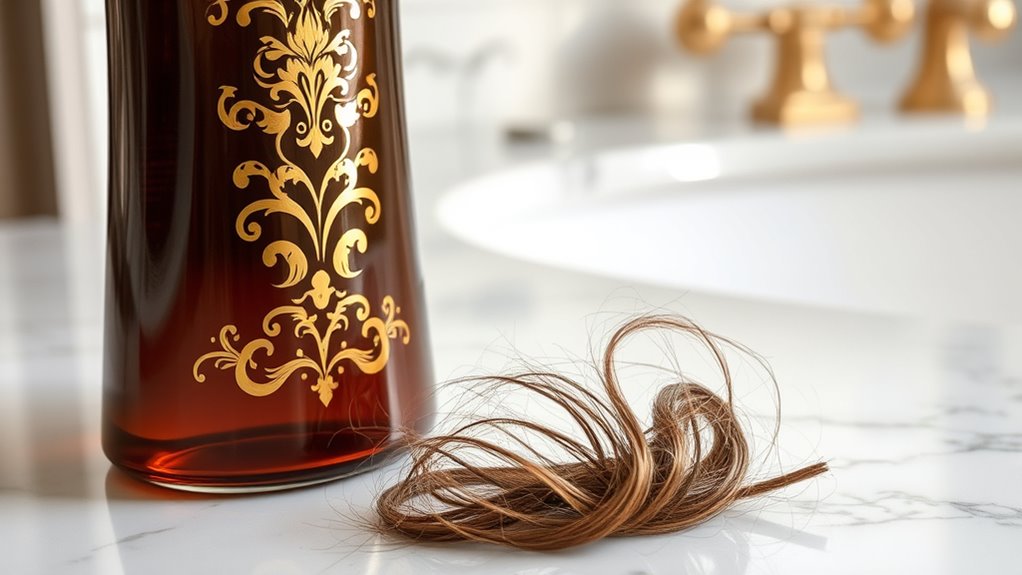
Some expensive shampoos can actually weigh down or dry out your hair because they contain ingredients like silicones and harsh surfactants. Silicones, such as dimethicone, build up on your hair and scalp over time, making your hair feel heavy and look dull. These ingredients can also trap oils and dirt, leading to a greasy appearance despite the luxurious branding. Additionally, many high-end formulas include alcohols or strong surfactants that strip away your natural oils, causing dryness and brittleness. This can leave your scalp irritated and flaky, especially with frequent use. In the long run, the buildup from silicones and harsh ingredients can clog hair follicles, impair scalp health, and hinder healthy hair growth, making your hair weaker and less vibrant.
Personal Experiences: When Fancy Shampoos Make Hair Look and Feel Worse
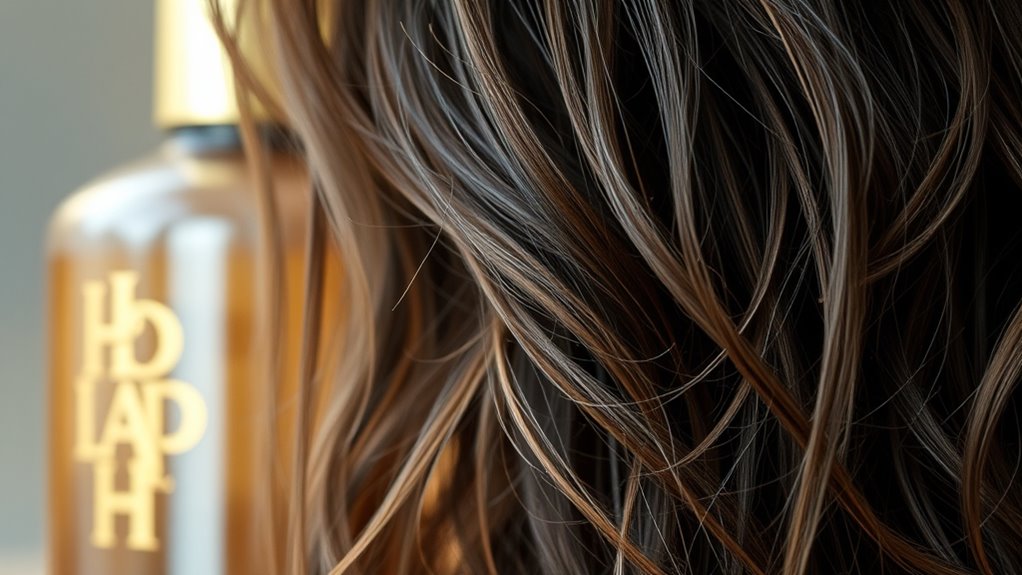
Many people find that switching to expensive shampoos can actually make their hair look worse instead of better. Personal experiences reveal that these products often lead to dullness, greasiness, or weighed-down hair. You might notice increased dryness, brittleness, or scalp irritation after trying high-end brands. Sometimes, the ingredients in these shampoos worsen scalp issues or cause buildup, damaging hair over time.
Consider these points:
- Expensive shampoos may cause hair damage by stripping natural oils, resulting in dryness and brittleness.
- Scalp irritation can worsen, leading to discomfort and flaky scalp issues.
- Over time, hair’s volume and shine decrease, contradicting the claims of luxury and quality.
Reverting to affordable shampoos often restores healthier hair and scalp.
Choosing Affordable and Effective Alternatives for Healthy Hair

Are you tired of spending a fortune on shampoos that don’t deliver? Switching to affordable shampoos can be a game-changer for your hair health. Look for products from trusted brands like Pantene or Suave, which contain effective ingredients that promote hair growth and reduce hair damage. Hair care tips emphasize choosing gentle, sulfate-free formulas tailored to your hair type—whether curly, straight, or dyed—so you can clean your hair without stripping moisture. Cost-effective options often skip harsh chemicals found in pricier brands, lowering the risk of scalp irritation. Regularly switching to these trusted, budget-friendly shampoos can help restore your hair’s vitality if damage has occurred. Reading labels carefully ensures you get the right ingredients without paying extra for marketing hype. Additionally, selecting shampoos designed for specific hair types can further improve overall hair health and appearance. Using gentle, sulfate-free formulas can also help prevent scalp irritation and maintain your hair’s natural moisture balance. Being aware of harsh chemicals commonly found in some high-end shampoos can help you make safer, more informed choices for your scalp and hair health. Incorporating shampoos with natural ingredients can also support healthier hair and scalp over time.
Frequently Asked Questions
Which Shampoos Are Linked to Hair Loss?
You might notice hair loss linked to shampoos with formaldehyde-releasing preservatives like DMDM hydantoin, or high-end brands with ingredients such as quaternium-15 and parabens. Harsh surfactants like sodium lauryl sulfate can also cause scalp inflammation and thinning. Additionally, unregulated or counterfeit shampoos may contain harmful chemicals that damage your scalp and hair. Always check ingredients and choose reputable brands to avoid these risks.
Why Is Store Bought Shampoo Bad for Your Hair?
Store-bought shampoos can be bad for your hair because they often contain harsh ingredients like sulfates that strip natural oils, leading to dryness and irritation. They also include synthetic fragrances and preservatives that may cause scalp sensitivity. Heavy silicones and conditioning agents can build up, clogging follicles and causing thinning. Additionally, drying agents like alcohol can make your hair brittle and prone to breakage over time.
Why Does Expensive Shampoo Make My Hair Feel Like Straw?
Your hair’s like a delicate garden, but expensive shampoos can act as harsh weather, stripping away its natural moisture. The high alcohol and sulfates in these products act like a relentless storm, leaving your hair dry and brittle. Heavy silicones and buildup weigh your hair down, turning it into straw. Without proper rinsing, these ingredients trap damage, making your hair feel rough and unmanageable, like straw in the wind.
How Do You Know if Your Shampoo Is Damaging Your Hair?
You can tell if your shampoo is damaging your hair if you notice increased dryness, brittleness, or split ends soon after use. It might cause scalp irritation, excessive oiliness, or hair breakage. If your hair feels straw-like or looks dull despite regular washing, your shampoo could be to blame. Check the ingredients for harsh chemicals like sulfates, parabens, or alcohol, which often harm your hair over time.
Conclusion
So, next time you’re tempted by that fancy shampoo, think twice. Just like a diamond isn’t always a girl’s best friend, expensive doesn’t always mean better, especially for your hair. Opt for simpler, gentle products that nourish rather than harm. Your hair deserves the same care as a delicate flower—healthy, vibrant, and free from harsh chemicals. Remember, sometimes, the best things in life are simple, affordable, and naturally effective.
